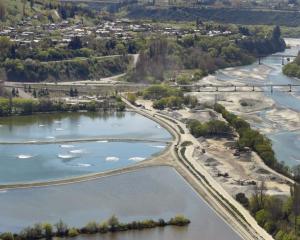
Take Associate Agriculture Minister Mark Patterson, for example.
Under the benign and avuncular chairmanship of Waitaki National MP Miles Anderson, the biggest tension of Mr Patterson’s appearance before the primary production select committee came even before proceedings began, from the revelation there was such a thing as a cream cheese latte.
It would be fair to say this discovery divided MPs’ opinions as much as the likes of the Treaty Principles Bill — and not down party lines either.
The Taieri New Zealand First list MP’s appearance was primarily with his Minister for Rural Communities hat on, although no appearance anywhere by Mr Patterson would be complete without a mention or two of wool. Of which, more shortly.
Mr Patterson’s opening remarks emphasised rural communities is not a Cinderella enterprise set up to keep a backbencher busy: last year it reviewed more than 120 Cabinet papers to advise how decisions might impact country folk, as well as engaging directly and regularly with 12 other ministries.
Mr Patterson — a farmer himself — said the four main issues he had focused his team on were health, education, connectivity and law and order.

"Rural communities is not all about agriculture, it is about the needs of about 860,000 people," Mr Patterson said.
Wellbeing — in particular mental wellbeing — was a focus of Mr Patterson’s presentation. In the recent Budget the Rural Wellbeing Fund received an extra $2 million to double its funding over the next four years, and the government also committed $3m to Rural Support Trusts.
"They have proven their worth, not just during adverse events but also managing farmers facing mental health issues ... there is a real issue with isolation and the issues that come with that," Mr Patterson said.
"The trusts have credibility and are well led, we have confidence in them ... a lot of this is driven by volunteers, it is genuine peer-to-peer, farmers talking to farmers. That’s their secret sauce and it is us leaning into that and saying you have something here that works, what can we do to help it?"
The previous week Mr Patterson, along with almost every MP, had been at the annual Field Days event in Hamilton.
There he got to push many things, not the least of which was wool — he and Finance Minister Nicola Willis were there as the not at all coincidental announcement was made by Kainga Ora that it had signed a deal for wool carpets to be supplied to state houses.
A week later, Mr Patterson was keen to stress this was likely to be only the start — which was music to the ears of committee members like Mr Anderson, who until entering politics was a sheep farmer.
"There are 130 procurement arms in government so there is significant ability to be able to leverage government procurement to assist the wool industry," Mr Patterson said.
Scrutiny Week is an innovation of this Parliament and in the run-up to last week’s hearings each select committee released a report as to how members thought it was going.
The primary production committee noted it had spent eight hours on estimates hearings in 2024-25, and under the previous regime it heard from the relevant ministers and officials for just four hours. Even more impressive was the amount of time spent on annual reviews — up from four hours to 13-14.
"Our committee has enjoyed the opportunity Scrutiny Weeks provide to dedicate time to hearing from ministers or entities, with that being the only focus for the week," the report said.
"It has meant that we get to drill down on particular matters of concern, current issues, and spending without having to squeeze this in around normal business. Being able to focus on scrutiny, and take our time with hearings, has made the process less challenging than the previous approach of scheduling scrutiny hearings within normal meeting times."
So far so good, but not everyone was happy. Opposition MPs — some of whom seem to feel that scrutiny was invented just for them — have complained (and not just on primary production) that they are not getting enough time for supplementary questions.
Although not endorsing the idea, the committee suggested consideration be given to having an Opposition MP become its chairperson for scrutiny hearings could help avoid that perception.
The social services and community committee (chaired by National Southland MP Joseph Mooney) reported in a similar vein, saying it had also increased its time on scrutiny, but warning its workload was already considerable so it had not been feasible to double that allocation of time.
The report also noted that while Mr Mooney had allocated the majority of questions to non-government MPs, "some of us consider that a culture shift is still needed to honour the Opposition’s role in leading scrutiny of the executive".
The committee resolved to "continue to reflect on this over the parliamentary term," although good luck coming up with a definitive answer.
The general tenor of all the reports was in similar vein: great concept but needs some tweaking, which seems a fair call.
Anything that obliges the government to fully explain what it is up, to to the people who put them there, is welcome accountability — but it only means something if the level of questioning actually makes someone accountable.
In the meantime, cream cheese latte anyone?











